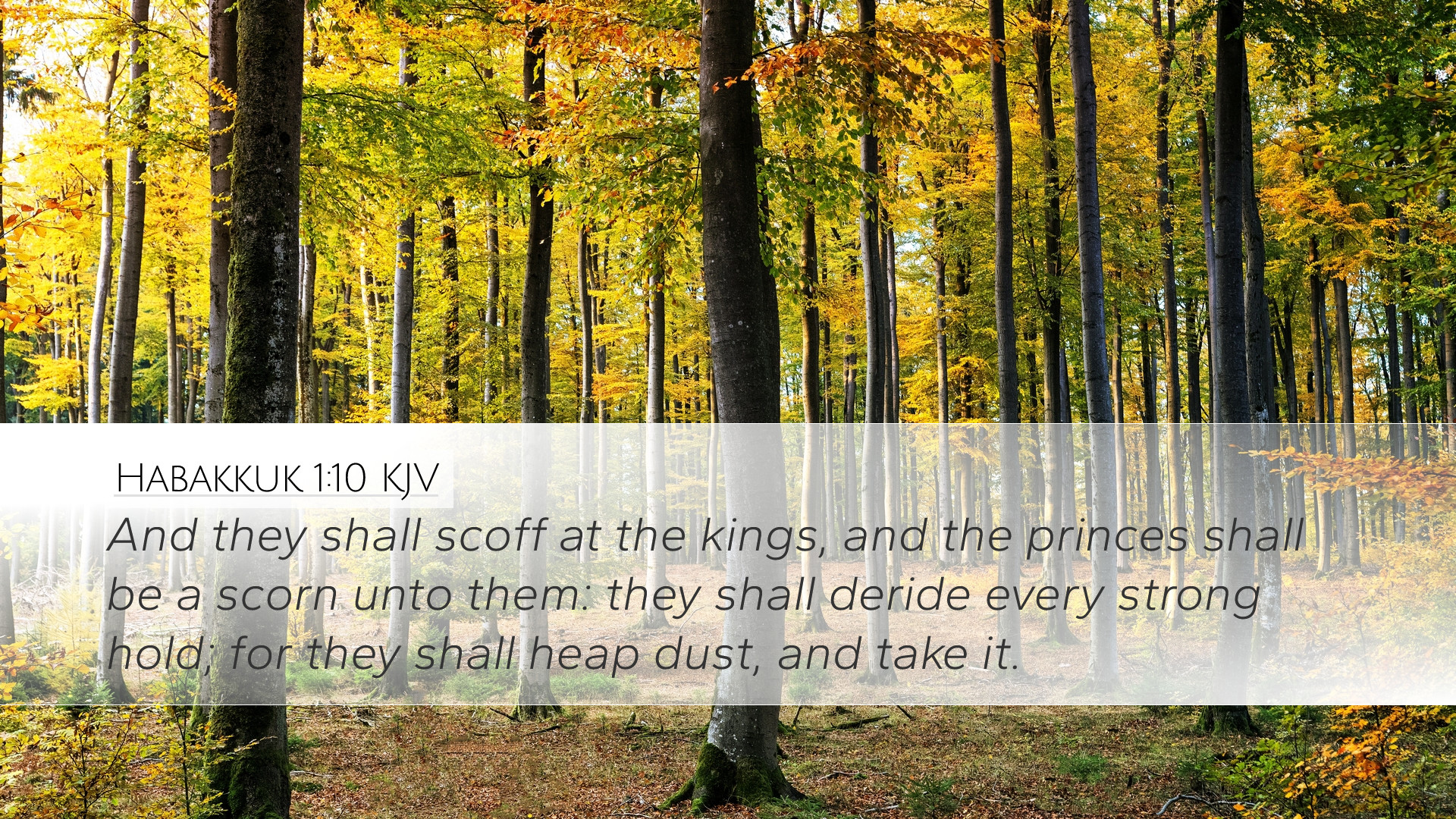Old Testament
Genesis Exodus Leviticus Numbers Deuteronomy Joshua Judges Ruth 1 Samuel 2 Samuel 1 Kings 2 Kings 1 Chronicles 2 Chronicles Ezra Nehemiah Esther Job Psalms Proverbs Ecclesiastes Song of Solomon Isaiah Jeremiah Lamentations Ezekiel Daniel Hosea Joel Amos Obadiah Jonah Micah Nahum Habakkuk Zephaniah Haggai Zechariah MalachiHabakkuk 1:10
Habakkuk 1:10 KJV
And they shall scoff at the kings, and the princes shall be a scorn unto them: they shall deride every strong hold; for they shall heap dust, and take it.
Habakkuk 1:10 Bible Commentary
Commentary on Habakkuk 1:10
Habakkuk 1:10 states: "And they shall scoff at the kings, and the rulers shall be a derision unto them: they shall deride every stronghold; for they shall heap dust, and take it."
Introduction
This verse is embedded in the context of Habakkuk's dialogue with God regarding the impending judgment upon Judah by the Chaldeans (Babylonians). It reveals the nature of the invaders – their arrogance, disdain, and contempt for authority and strength. This commentary compilation combines insights from Matthew Henry, Albert Barnes, and Adam Clarke to illuminate the theological and practical implications of this verse.
Understanding the Chaldeans
The Chaldeans, depicted as a fierce and ravenous people, are essential to understand the significance of this verse:
- Instruments of Judgment: The Chaldeans are God's chosen instrument for His judgment upon Judah’s unrighteousness. This marks their role as both the means of God's justice and, paradoxically, as a subject of derision.
- Enemies of God's People: Their triumph over Judah presents a stark reminder of God's sovereignty and the consequences of sin.
- Ruthlessness: The Chaldeans' actions in deriding both rulers and fortified cities illustrate their unchecked power and relentless ambition, as they view themselves above those they conquer.
Contextual Analysis
As we delve deeper into the verse, we can appreciate the broader narrative and prophetic themes of Habakkuk:
- Spiritual Struggle: Habakkuk grapples with the moral and theological implications of a just God allowing such wickedness to prevail.
- Divine Sovereignty: The verse underscores that despite the apparent triumph of evil, God remains in control, and His purposes will ultimately prevail.
- Judgment and Restoration: While the Chaldeans are empowered to act, their eventual downfall is assured, serving as a reminder of God's ultimate justice.
Insights from Public Domain Commentaries
Matthew Henry
Matthew Henry reflects on the audacity of the Chaldeans who not only conquer but mock the very rulers of the nations, emphasizing their cruelty and pride. He suggests that their scoffing at kings reveals a deeper spiritual truth:
- Human Arrogance: This scoffing illustrates the heights of human arrogance when one believes they stand unopposed in their ways.
- Divine Governance: Despite their rebellion, God governs the affairs of nations, and their confidence will soon be turned into calamity.
Albert Barnes
Albert Barnes provides a detailed examination of the phrase "they shall scoff at kings" to highlight several theological implications:
- Mockery of Authority: The Chaldeans’ mockery is presented as a warning against placing trust in earthly powers.
- The Nature of Evil: Barnes emphasizes that evil often mocks both human authority and divine principles. He warns readers to be vigilant about the dangers of arrogance.
- Assured Judgment: The apparent successes of the wicked will ultimately become their downfall as God's judgment is certain.
Adam Clarke
Adam Clarke approaches the passage with a keen linguistic analysis of the terms used to describe the Chaldeans’ actions:
- Heap Dust: Clarke interprets this phrase as a metaphor for the Chaldeans’ acts of laying waste to cities and strongholds, reducing them to mere dust.
- Comparison to Other Invaders: He contextualizes the behaviors of the Chaldeans within the history of invasions in Israel, highlighting that similar mockery has been seen throughout Israel's history.
- Spiritual Implications: Clarke argues that while the Chaldeans were a real threat, their actions serve as allegories for the spiritual battles every believer faces against pride, sin, and evil.
Theological Reflections
The implications of Habakkuk 1:10 extend beyond its immediate context and stir profound theological reflections:
- God’s Sovereignty and Justice: The verse serves as a reminder that God’s sovereignty encompasses even the actions of evildoers. It is vital not to lose sight of God’s overarching plan amidst apparent chaos.
- Expected Response of the Remnant: For the believers in Judah, there is a call to steadfastness and faith, recognizing that their current situation is temporary and that righteousness will ultimately prevail.
- Warning Against Complacency: Believers are encouraged to heed the warning of the consequences of sin as exemplified by the mocking attitude of the Chaldeans toward authority.
Practical Applications
The lesson from Habakkuk 1:10 transcends time, offering practical wisdom for contemporary readers:
- Resistance to Arrogance: As the Church, we are called to resist the prideful attitudes that can creep into our hearts, remaining humble before God.
- Trust in God’s Justice: In facing injustices and trials, we are reminded to trust in God's ultimate judgment and restoration, even when evil seems to flourish.
- Discernment in Leadership: The verse speaks to the importance of godly leadership and governance, reminding believers to pray for rulers and leaders to uphold justice.
Conclusion
In summary, Habakkuk 1:10 serves as a poignant reflection on the nature of pride, judgment, and God's sovereignty. Drawing insights from respected commentaries, we see a mosaic of understanding that reverberates through history, reminding us of the eternal principles governing God's relationship with humanity.
As we encounter this scripture in our studies, may it inspire us to remain steadfast in faith, vigilant against the temptations of pride, and assured of God’s ultimate justice.


